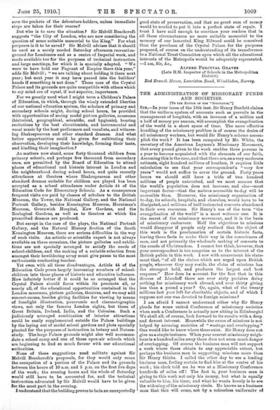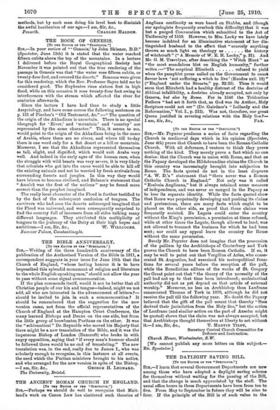THE ADMINISTRATION OF MISSIONARY FUNDS AND SOCIETIES.
pro me EDITOR Of vas "SrEortmal Sin,—In your issue of the 18th inst. Sir Henry Burdett claims that the uniform system of accounts such as prevails in the management of hospitals, with an increase of a million and a half of money per annum, will accomplish the evangelisation of the world in a short space of time. The more effective handling of the missionary problem is of course the desire of all missionary workers, but would Sir Henry's scheme accom- plish the work ? It has been computed by Mr. White, the secretary of the American Laymen's Missionary Movement, that every pound given to the work enables three persons in a year to become acquainted with the elements of our faith. Assuming this is the case, and that there are, on a very moderate estimate, eight hundred millions of heathen, it requires little calculation to see that your correspondent's " very few years " would not suffice to cover the ground. Forty years hence we should still have a trifle of two hundred millions of people untouched, and we must assume that the world's population does not increase, and also—most important factor—that the natives accessible to-day will be accessible then. Moreover, the missionary organisation of to-day, its schools, hospitals, and churches, would have to be dissipated, and millions of half-instructed converts abandoned to their own resources. Sir Henry's use of the term " the evangelisation of the world" is a most welcome one. It is the secret of the missionary movement, and it is the basis of missionary endeavour. Half the objections to missions would disappear if people only realised that the object of this work is the proclamation of certain historic facts, leaving those facts to make their way in the consciences of men, and not primarily the wholesale making of converts to the creeds of Christendom. I cannot but think, however, that your correspondent is too sanguine as to the interest of the British public in this work. I saw with amazement his state- ment that, "of all the claims which are urged upon British people, wherever they may reside, the claim of missions has the strongest hold, and produces the largest and best response." How does he account for the fact that in this diocese of Llandaff there are over sixty parishes doing nothing for missionary work abroad, and over thirty giving less than a pound a year ? Or, again, what of the twenty millions last year left for charitable objects, and of which I suppose not one was devoted to foreign missions?
I am afraid I cannot understand either why Sir Henry pleads for some united Conference of missionary societies when such a Conference is actually now sitting in Edinburgh! We shall all, of course, look forward to its results with a deep and devout interest. Meanwhile the cause of missions is not helped by accusing societies of "wastage and overlapping." One would like to know where these exist. Sir Henry does not give us a single instance. When your nearest missionary neigh- bour is a hundred miles away there does not seem much danger of overlapping. Of course the business man will not support a work where these obtain to any appreciable extent, but perhaps the business man is supporting missions more than Sir Henry thinks. I called the other day to see a leading business man, feeling certain to find him at the centre of his work ; his clerk told me he was at a Missionary Conference hundreds of miles off ! The fact is, your business man is giving to this work not only his money, but what is equally valuable to him, his time; and what he wants keenly is to see the widening of the missionary circle. He knows as a business man that this will come, not by a colourless uniformity of methods, but by each man doing his level best to diminish the awful heathenism of our age.—I am, Sir, &c.,























































 Previous page
Previous page